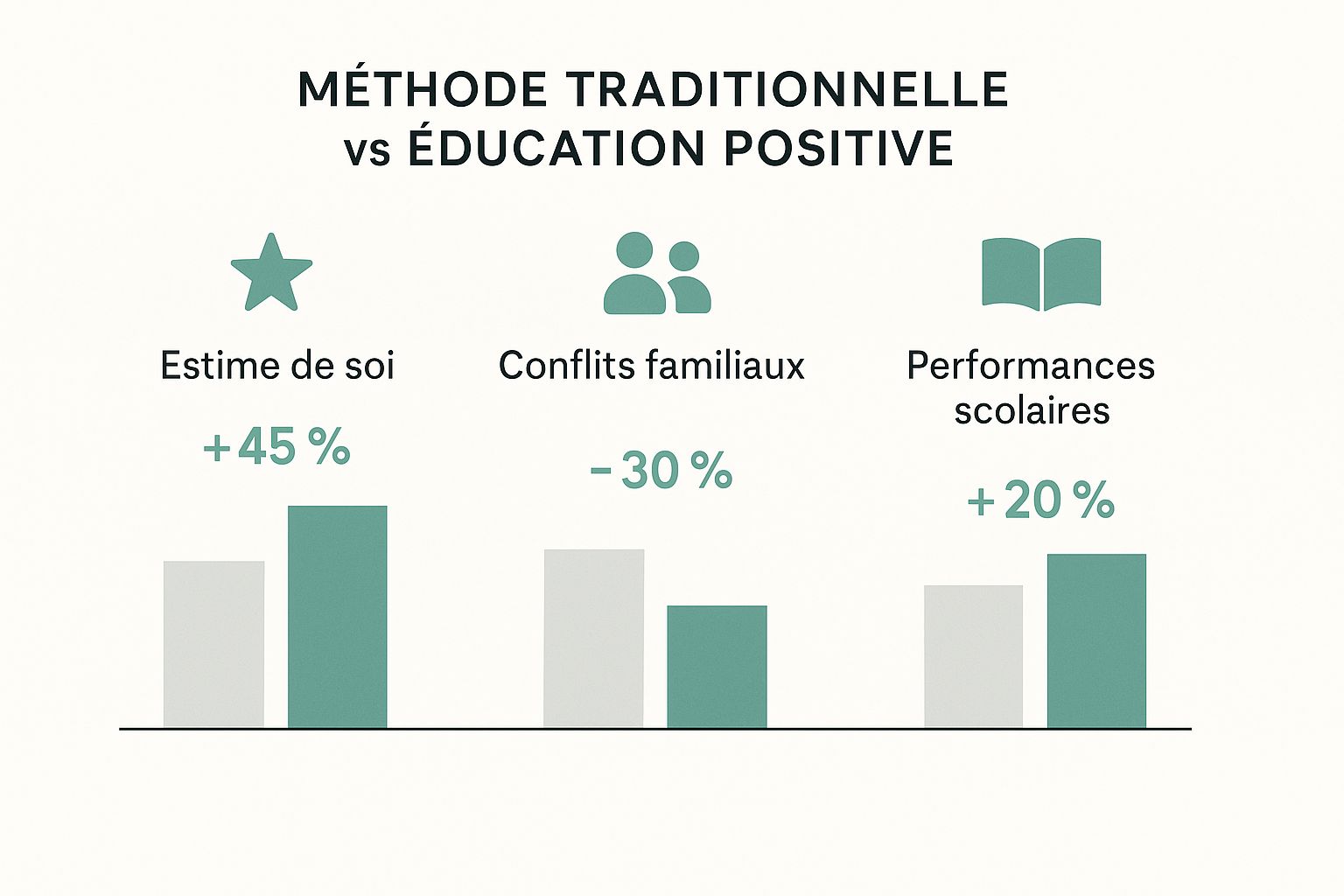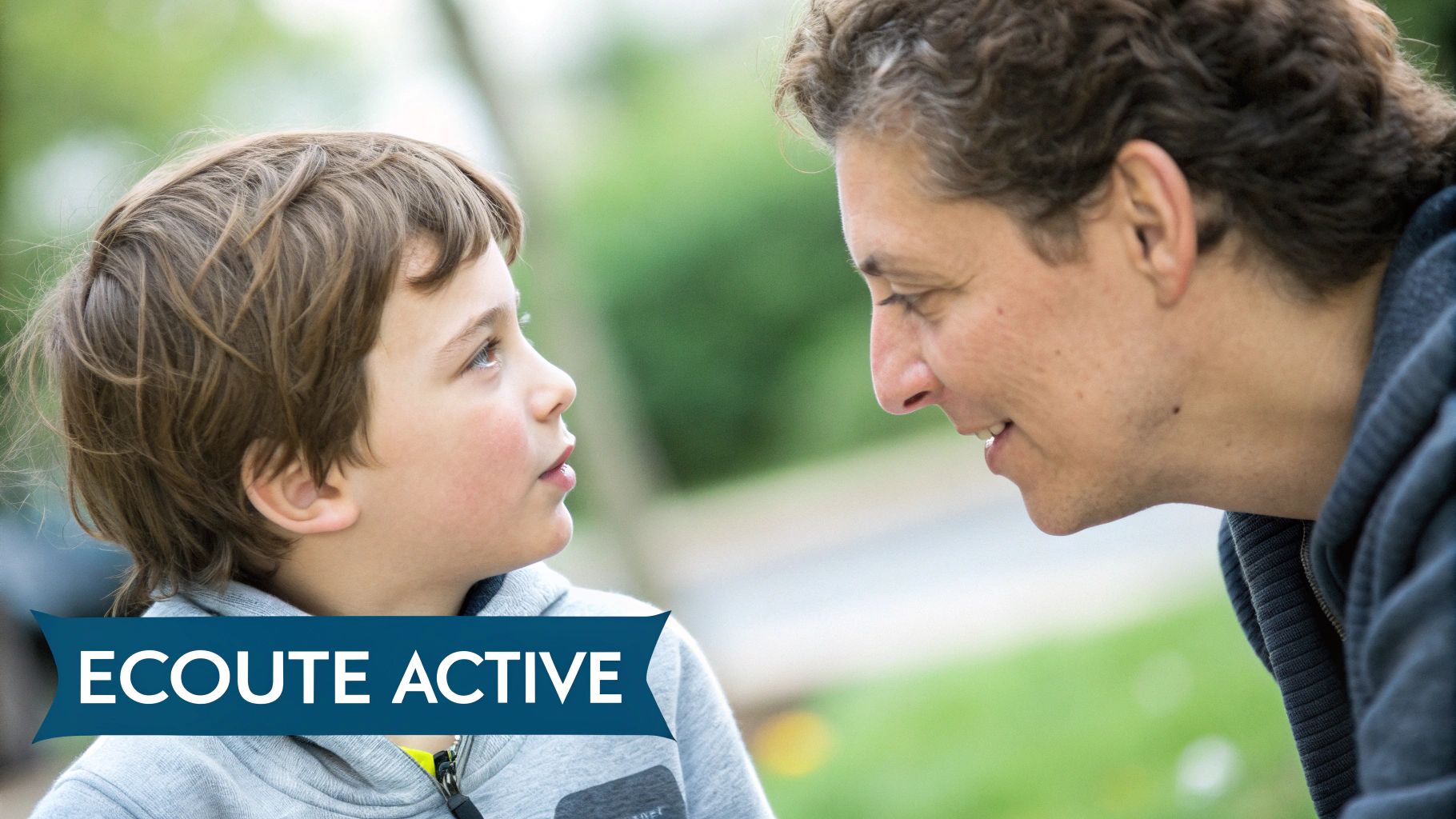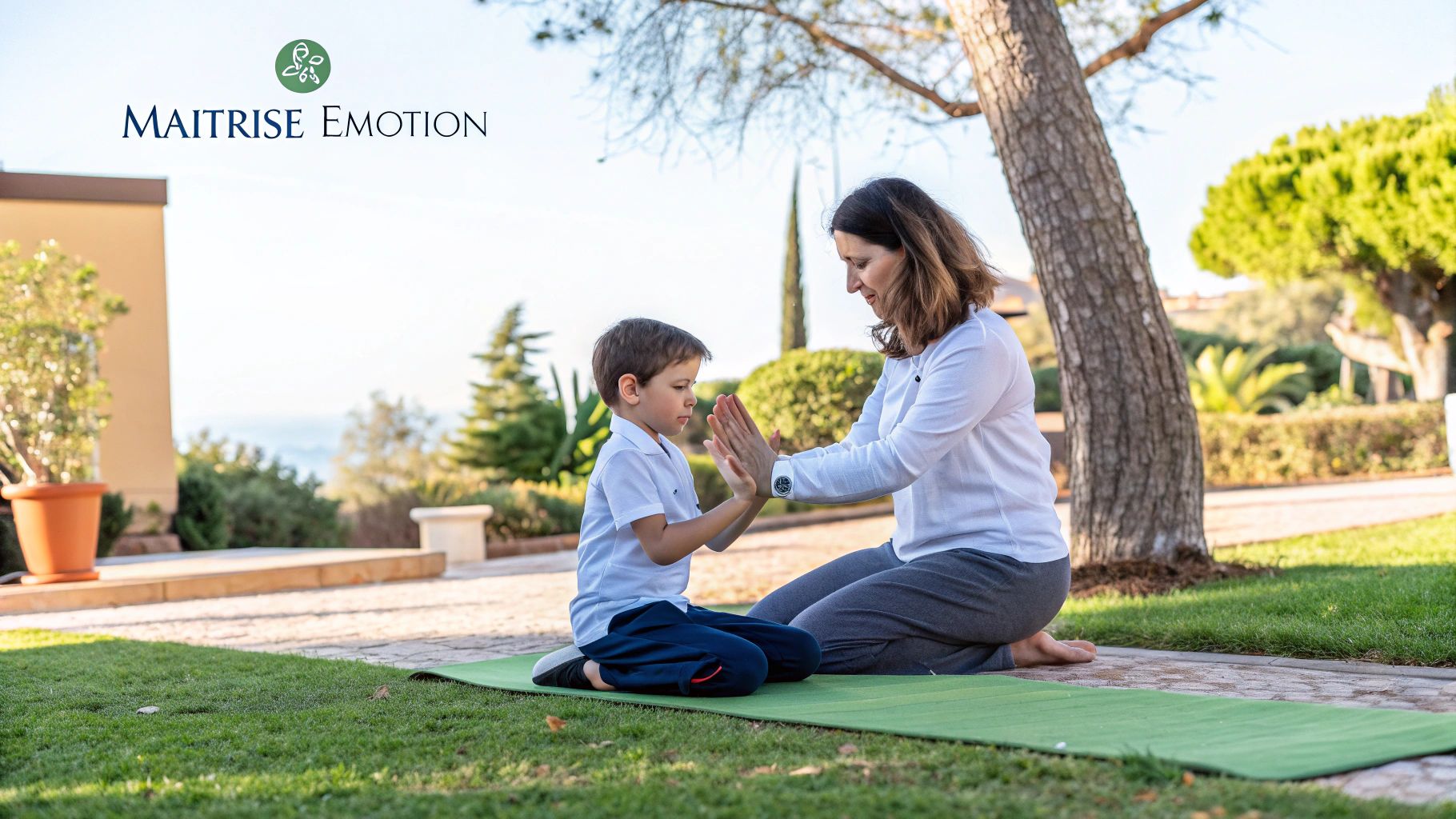Talking about positive parenting is much more than just a trend or a list of tips. It's a true family philosophy, an invitation to build a relationship of trust and respect with your child. The goal is to find the perfect balance between genuine kindness and clear rules, to accompany your child from 6 to 12 years old on the path to autonomy and self-confidence, without ever slipping into laxity.
What is positive education, concretely?

Imagine that parenting isn't a battlefield, but a garden you cultivate together. Positive parenting means choosing the best tools for your child to thrive: attentive listening to their emotions, empathy for their challenges, and cooperation to find solutions together.
Be careful, this doesn't mean allowing everything or giving in to every whim. On the contrary, this approach gives us the keys to setting healthy and respectful boundaries, while nurturing the precious bond that unites us with our child. It's about guiding them with kind firmness to help them grow up independent and confident.
The French gap: between tradition and benevolence
In France, a wind of change is blowing through parenting. More and more parents are embracing positive parenting, eager to better understand and respect their child's emotions and rhythm. Yet, a paradox persists on a daily basis.
Despite this desire for greater gentleness, parental habits in France on Magicmaman.com show that punishment remains a common practice. We navigate between sometimes rigid educational traditions and this new philosophy centered on connection.
Positive parenting is not a rule-free method, but a balance between firmness and kindness. Its goal is to guide the child by teaching them to understand and respect the framework, rather than submit to it through fear.
Building a relationship of trust that fuels growth
Adopting a positive approach means making a conscious choice to invest in your relationship. Rather than focusing solely on the behavior that needs correcting, you learn to look for the underlying need or emotion.
For a child between the ages of 6 and 12, this period is crucial for building their identity and self-esteem. A positive approach makes a huge difference:
- Developing emotional intelligence: By helping them name what they feel (anger, sadness, joy), you give them the keys to better navigate their own inner storms. Practical tip: Create an "emotion wheel" at home to help them identify what they feel.
- Encourage cooperation: By involving them in finding solutions (for example, for organizing screen time or distributing chores), you make them active and responsible. Example: Hold a weekly "family council" to discuss minor concerns and celebrate successes.
- Strengthen his autonomy: By valuing his efforts more than the result, you nourish his motivation and his desire to learn on his own.
The goal is not to be a perfect parent, but to create a home where your child feels listened to, understood, and safe enough to explore the world and reach their full potential.
The pillars of firm yet caring parenting
Positive parenting isn't an abstract theory; it comes to life in our everyday actions and words. For parents of children ages 6 to 12, this approach is based on solid principles that combine firmness and kindness, creating a framework that is both secure and stimulating.
The fundamental principle is simple: always connect before correcting. Before addressing the behavior, take a moment to connect with your child's emotion. This is the key to turning a confrontation into a learning opportunity.
Connection before correction: the first step towards cooperation
Picture this: Your child comes home from school and slams the door after a comment about their bag lying around. Your first instinct might be to raise your voice. Positive parenting encourages you to take a break.
Later, once things have calmed down, approach him and try an empathetic approach: "I get the feeling you've had a rough day. You seem really angry." By validating his emotion, you open the door to dialogue. This will make the discussion about house rules more constructive.
Kindness doesn't mean accepting everything. It involves addressing the causes (emotions, unmet needs) before treating the symptoms (inappropriate behaviors). A child who feels understood is a much more cooperative child.
This simple approach builds confidence. Your child learns that they can express their frustrations without fear of judgment or rejection—a fundamental pillar of their emotional well-being.
Encouragement Rather Than Praise: Cultivating Lasting Self-Esteem
We all want our children to feel confident, and we often shower them with praise: "You're the best!" "Your drawing is perfect!" While the intention is good, praise focuses on the outcome and can unintentionally create a fear of failure.
Encouragement, on the other hand, highlights effort, process, and progress . This is a much more powerful way to build strong self-esteem.
- Instead of saying, "You got a 20/20, you're so smart!"
- Instead, try: "I saw how hard you worked for that test. You can be proud of your perseverance."
- Instead of saying: “Your goal was magnificent, you are a champion!”
- Instead, try: "I loved seeing your team spirit on the field. You played really well together!"
Encouragement teaches children that their worth depends not on their successes, but on their commitment and ability to overcome challenges. This is how resilience and intrinsic motivation are cultivated.

These figures confirm it: a caring educational environment has a direct and positive impact on the emotional well-being of the child and on family harmony.
Involvement to foster cooperation and responsibility
Another pillar is to involve your child in finding solutions. When a problem arises, instead of imposing a punishment, invite them to brainstorm with you. This empowers them and shows them that their opinion matters.
Concrete example: the challenge of screens
Screens are a common source of tension. Instead of imposing unilateral rules, organize a "family council":
- State the problem without accusing: "I notice we often argue in the evenings about screens, and it makes me sad. I'd like us to find a solution together so our evenings are more peaceful."
- Listen to his point of view: “For you, what is important about screens? What do you like to do on them?”
- Brainstorm ideas together: "What ideas do you have for us to enjoy screen time without it ending in conflict? We write down all the ideas, even the craziest ones."
- Choose a common solution and test it: "Okay, let's try your suggestion: 30 minutes after homework. We'll talk about it again next Friday to see if it works for everyone."
By involving them, you transform a power struggle into a team project. Your child becomes a co-creator of the rule, which makes them even more motivated to follow it.
The impact on your child's confidence and creativity

Think of positive parenting as fertile ground. It's in this rich soil that your child's confidence and creativity will grow. When they feel listened to, safe, and valued for who they are, they'll dare to explore, take initiative, and build a positive self-image. It's a true virtuous circle for their personal development.
A caring environment isn't about overprotecting them from difficulties, but about giving them the tools to cope. They learn that their emotions, even frustration or disappointment, are valid messengers. This is the foundation of strong emotional intelligence.
Building Self-Confidence, One Step at a Time
Self-confidence is built day after day, through experiences and the way we see our children. Between the ages of 6 and 12, the parental gaze is a particularly powerful mirror.
Practical tips for building your confidence:
- Give them real responsibilities: age-appropriate ones, like setting the table, tending a plant, or helping to organize a family outing. Feeling useful and competent is incredibly rewarding.
- Value the process, not just the result: "I saw all the effort you put into this project. Look at how much you learned by doing it!" He learns that perseverance is a success in itself.
- Let him find his own solutions: If he struggles with an assignment or game, guide him with open-ended questions: “What else could you try? What would be the first small step?” This reinforces his sense of capability.
Managing frustrations to cultivate resilience
One of the greatest gifts of positive parenting is teaching your child that failure isn't an end in itself, but an essential step in learning. Your role is to support them through their frustrations, without minimizing them.
When he's overwhelmed by strong emotion, your calmness becomes his anchor. Simply being present and acknowledging what he's feeling ("I get it, it's really frustrating when things don't go your way") shows him how to weather emotional storms.
One of the major benefits of this approach is developing resilience . A child who learns to manage frustration and overcome obstacles is a child who will have confidence in his or her ability to face life's challenges.
This approach extends beyond the family. Many schools are inspired by it by creating quiet spaces or by valuing individual effort, which promotes a calm and cooperative classroom environment. To learn more, you can consult these concrete examples on Yoopala.com .
Unleash your creativity in a safe environment
Creativity isn't just artistic; it's the ability to find new solutions. A child who fears judgment or making mistakes will tend to stick to familiar thought patterns.
Conversely, a family environment where mistakes are allowed and curiosity is encouraged becomes a wonderful incubator for creativity. Your child will feel free to think "outside the box," ask bold questions, and let their imagination run wild. Positive parenting gives them permission to dream, try, and start again.
Debunking criticism and preconceived ideas
Positive parenting is increasingly popular, but it's also plagued by many misunderstandings. Some parents fear raising "king children" with no limits, while others mistake it for permissiveness. These concerns are legitimate and deserve to be addressed.
It is essential to understand that kindness and firmness are not opposites, but complementary. The goal is not to abolish rules, but to establish them with respect and give them meaning.
Let's untangle the truth from the lies together so you can adopt this philosophy in an informed way, adapting it to your own family.
Is this a method without any limits?
This is the most persistent prejudice. In reality, positive education advocates the opposite. Children, especially those between the ages of 6 and 12, have a fundamental need for clear boundaries to feel safe and structured.
The difference lies in how you set those boundaries . Instead of using force or fear ("Do it because I say so!"), you try to make them meaningful. A framework set with calm, caring firmness is reassuring and teaches mutual respect.
A limit is not a punishment. It's a reassuring safeguard that helps children understand their environment and the needs of others. The goal is not to achieve submission, but to encourage cooperation.
For example, instead of yelling, "Come do your homework right now!" set the limit respectfully: "I see you're having fun, but now it's time to do the homework. You can resume your game right after." It's clear, non-negotiable, but said without aggression.
Does positive education create child kings?
This fear stems from a confusion between listening to a child's needs and giving in to their every desire. These are two very different things.
Validating an emotion ("I understand that you're very disappointed not to have this toy") doesn't mean giving in ("...so I'll buy it for you"). On the contrary, by supporting your child's frustration, you help them develop tolerance, an essential life skill. A child who grows up with mutual respect learns empathy, not self-centeredness.
Ultimately, a "king child" is often a child who lacks clear direction and feels anxious. A child who is listened to and guided firmly learns to take into account the needs of others, including those of their parents.
Does this approach really prepare you for real life?
Some fear that while protecting children, this approach does not prepare them for the "harshness" of the world. This debate has been raised in France, particularly by child specialists who warn of the risks of "positive" parenting without firmness. To explore this point of view in more depth, you can consult the full analysis on Philomag.com .
However, preparing a child for life is not about prematurely confronting them with harshness, but rather giving them the tools to cope with it. It is about building a solid inner "toolbox":
- Resilience: By normalizing mistakes, we teach them that failure is part of learning.
- Self-confidence: A child who feels competent at home will dare to face challenges outside.
- Emotional intelligence: Knowing how to identify and manage your emotions is the best asset for navigating the complexity of human relationships.
When done well, positive parenting doesn't create a protective bubble, but rather builds an inner armor so your child can face the world with courage, empathy, and confidence.
Practical tools to transform your daily life

The theory of positive parenting is inspiring, but how do you integrate it into the daily grind? Here's a practical toolbox filled with strategies and sample sentences to help you move from idea to action.
The goal is to offer you tips when you feel helpless, whether it's dealing with long-winded homework, sibling arguments, or morning challenges. These tools will help you respond more calmly and effectively, strengthening your bond with your child.
Manage homework and tasks without yelling
Homework time can quickly become a battleground. Change your posture: shift from supervisor to caring coach.
Instead of "Do your homework now!" try a collaborative approach: "It's homework time. Which do you want to start with: math or French?" This small choice gives them a sense of control and encourages their engagement.
If he's dragging his feet, validate his emotion before setting the stage: "I see you don't have any desire to get started; it seems really difficult today. Okay. We'll take five minutes to drink a glass of water, then we'll work together for 20 minutes before another break. Is that okay with you?"
Formulations to defuse conflicts
The words we use have immense power. Some poison situations, others open the door to dialogue.
The table of positive communication
| Instead of saying (accusatory) | Try to say (descriptive and solution-focused) | Why it works |
|---|---|---|
| “You never put your things away!” | "I see your bag on the floor. Where does it fit so no one trips over it?" | You describe the problem without attacking and invite them to find the solution themselves. This is empowering. |
| “Stop arguing!” | "I hear shouting, you sound very angry. How could you find a solution that's fair for both of you?" | You move from judge to mediator. You recognize their emotions and guide them toward autonomy. |
| “Hurry up, we’re going to be late!” | "We have 10 minutes left before we leave. What do you need to be ready on time?" | You turn a stressful order into a team challenge with a clear goal. |
Adopting this language takes practice, but it can radically transform the atmosphere at home. Your child feels respected and becomes a partner in problem-solving.
Establish family rituals that strengthen bonds
For a child between the ages of 6 and 12, rituals are essential anchors. They provide security, predictability, and a deep sense of belonging. The family council is one of the most powerful rituals.
Family council is a weekly meeting where everyone, parents and children, can share their thoughts on what's going well and what could be improved at home. It's a time dedicated to celebrating successes, finding solutions to problems, and planning joyful moments together.
Easy setting up of the family council:
- Choose a fixed time: Sunday after dinner, for example.
- Set simple rules: We listen to each other without interrupting, we speak with respect, we look for solutions and not blame.
- Have a simple agenda: Start with a round of compliments, then address any points of discussion, and end by planning a family activity for the week.
This simple ritual teaches invaluable life skills: listening, argumentation, negotiation, and problem-solving.
Navigating Emotional Storms with Empathy
When your child is overwhelmed by anger or sadness, their rational brain is on pause. Trying to reason with them at this time is counterproductive. Your priority: help them regain their calm.
- Validate the emotion with simple words: "I see you're angry because your tower collapsed. This is really infuriating."
- Offer a reassuring presence: Sometimes just sitting next to them in silence is the greatest comfort. The message is clear: "I'm here, you're not alone in this big emotion."
- Offer a physical outlet for the emotion: "Do you want a hug? Or would you rather hit that pillow to get all your anger out?"
Only after the storm has passed can you talk about what happened. By doing this, you're not only teaching him how to manage his emotions; you're strengthening your connection, and that's the most valuable thing.
So, shall we embark on this new adventure?
If you've read this far, it's because the idea of more connected and fulfilling parenting resonates with you. Remember that positive parenting isn't a magic formula, but a personal journey. It's a journey filled with discoveries, trials, and sometimes "failures." And that's perfectly normal!
The goal isn't to become a perfect parent who never makes a mistake. It's about cultivating a new awareness of your role, striving to be more authentic and intentional in your relationship with your child, aligning your actions with your deepest values.
Create the parenting that suits you
This guide is a toolbox. Pick what resonates with you, test it, and adapt. Every family is unique; every child has their own temperament and needs.
The only model that will work is the one you tailor-make for your family. It must be in harmony with who you are and meet the specific needs of your child, whether they are 6, 8, or 12 years old .
It's not perfection that matters, it's intention. It's your sincere desire to do your best every day, with patience and love, that will make all the difference for your child and the harmony of your home.
And above all, trust yourself. No one knows your child better than you. Your parental intuition is your most valuable compass. Be kind to your child, but also, and above all, to yourself.
Your questions about positive education (and our answers!)
Embarking on a positive education journey is a bit like learning a new language: it raises a lot of questions, and sometimes we're afraid of making a mistake. That's completely normal! As parents, we want the best for our children, and it's precisely this desire that drives us to question ourselves. Let's take a look at the most common doubts together.
If I am "positive", does that mean I can never punish again?
This is the great myth of positive education! In reality, it's not about letting everything slide, far from it. The idea is rather to replace traditional punishment (often experienced as humiliation) with a consequence that makes sense for the child.
For example, instead of sending a child who has drawn on the wall to the corner, we will ask them to clean up their mess. We calmly explain to them that walls are not for drawing, but sheets of paper are! The goal? To teach them to repair things and take responsibility, without creating fear or shame.
How do I stay kind when I'm at the end of my rope?
Excellent question! The first person you need to be kind to is yourself. No one is a perfect parent, and it's perfectly human to lose patience. The important thing isn't to never break down, but to know how you handle the aftermath.
When you feel the heat rising in your nose, give yourself a break, even if it's just for a few seconds. Go to another room to take a deep breath. And if you yelled? Don't be afraid to apologize later: "I was really tired earlier and yelled. I'm sorry, I shouldn't have spoken to you like that." This will teach your child a valuable lesson: everyone makes mistakes, and they can always be fixed.
My 10-year-old keeps testing the limits, what should I do?
Welcome to preteen! At 10 , testing boundaries is not only normal, but it's also a healthy sign. It's their way of understanding the framework you've set, starting to form their own identity, and making sure the rules are solid. The key is to combine firmness with kindness .
A calm and convincing "no" will always have more impact than a shouted "no." Keep it simple: reiterate the rule without getting bogged down in endless explanations. Once the pressure has subsided, you can take a moment to discuss what happened.
Does this approach really work with all children?
Yes, simply because positive parenting isn't a recipe to be followed to the letter, but rather a philosophy that adapts to each family and each child. Its pillars—respect, listening, cooperation—are universal and beneficial for everyone, regardless of their temperament.
Obviously, the application will be different. A highly sensitive child will need a lot of gentleness when you set a limit. A more aggressive child, on the other hand, will need a very clear and consistent framework to feel safe. The key is to observe your child to understand their unique needs and adjust your approach accordingly.
To help your child explore their emotions and build their confidence, the My Book Story notebook is a fantastic tool. It transforms self-improvement into a creative and fun game, day after day.


